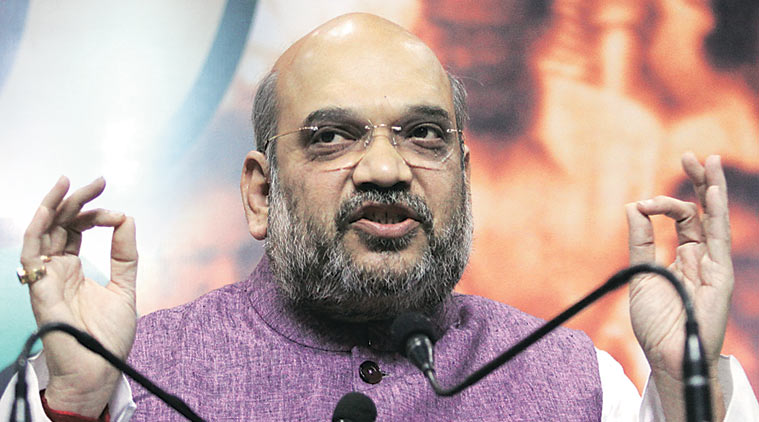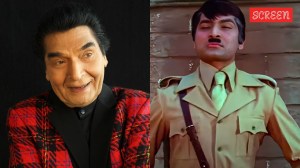Stay updated with the latest - Click here to follow us on Instagram
Sohrabuddin encounter: Supreme Court rejects plea to re-open Amit Shah’s case
"A person cannot be interminably prosecuted by allowing one proceeding after another against him,” the bench told senior lawyer Kapil Sibal, who argued for Mander.
 BJP president Amit Shah
BJP president Amit Shah
Stating that a person cannot be “interminably prosecuted”, the Supreme Court on Monday dismissed a plea by activist Harsh Mander to let him challenge the exoneration of BJP president Amit Shah in the Sohrabuddin Sheikh encounter case. Saying that there were serious questions over Mander’s locus standi (legal right to interfere), a bench of Justice S A Bobde and Justice Ashok Bhushan refused to allow former IAS officer Mander to lead a legal battle against a trial court’s decision to discharge Shah. The court said that Mander was neither the complainant in the case, nor an affected party.
“Do you realise the impact of allowing you to intervene? There are certain rights a person has under the criminal law. A person cannot be interminably prosecuted by allowing one proceeding after another against him,” the bench told senior lawyer Kapil Sibal, who argued for Mander. Sohrabuddin and his wife Kausar Bi were killed by the Gujarat police in an alleged fake encounter in 2005. Their aide Tulsiram Prajapati, an eyewitness to the encounter, was killed in 2006.
The two cases were clubbed and transferred from an Ahmedabad court to a Mumbai court in 2012 following a Supreme Court order. In December 2014, the special CBI court in Mumbai discharged Shah. In its discharge order, the court said the BJP chief was “apparently shown to be involved in this case by CBI for political reasons”.
While the CBI did not file an appeal against the order, Sohrabuddin’s brother Rubabuddin Sheikh challenged Shah’s discharge in the Bombay High Court, but later withdrew his plea. Mander’s attempt to challenge Shah’s exoneration was turned down by the High Court, compelling him to move the apex court.
The Supreme Court bench asked his lawyer, Sibal, to first explain Mander’s locus standi. “We cannot leave this question of locus standi so wide open that anybody can go and intervene in a criminal case. It is not a case where the prosecution was started on your complaint,” said the bench.
As Sibal cited previous judgments to assert that “any aggrieved person” could challenge an exoneration or withdrawal of prosecution in a serious matter, the bench retorted: “When the person is genuinely aggrieved, then the issue takes a different colour but when the person is not remotely connected and wants to revive the case, then it is an altogether different matter.”
Requesting the top court to allow him to challenge Shah’s exoneration before the Bombay High Court, Sibal contended that it was “unfair” of the CBI not to file an appeal after the trial court discharged him. He also highlighted that a new government had come to power at the Centre in 2014, following which the CBI made a U-turn.
But the bench said it would not engage in the politics of the matter. “We are not concerned about the CBI. We don’t know whether you are a political person or not and we are not concerned either… it is not for us to answer (why the CBI did not file an appeal). You will have to cross the hurdle of locus standi first,” it said.
At this, Sibal, who was assisted by senior lawyers Anand Grover and Rajeev Dhavan, argued that any person could file a complaint and trigger a prosecution in a corruption case. “But you (judges) may say that is in a corruption case and this is a murder case,” said the lawyer.
The bench replied: “Comparison does not always lead to the truth, Mr Sibal. Although some of us may claim we know the truth… there is a world of difference between a person genuinely aggrieved and others. It would have taken a different colour even if Rubabuddin had filed this case.”
Saying that the apex court could not shut its eyes when a serious injustice was being done, Sibal urged the bench to let his client file a revision petition in the High Court and seek re-trial of Shah since the CBI had even filed a chargesheet against the BJP president, naming him as Accused no. 16. “Public must get the feeling that nobody is above the law. Why should my petition be scuttled at this stage? Let the High Court hear me and then it can dismiss my petition on merits. If this person has to be discharged, he will be,” he submitted.
To this, the bench responded that it does not consider anyone above the law but the court has to examine the “standing” of the person before it. Senior advocate Harish Salve, who appeared for Shah, stressed on the dangers of allowing a third party to interfere in a criminal trial. “If this petition is allowed, anybody can join any trial saying he is an aggrieved person. Tomorrow, if a film star’s acquittal is not challenged by the State, somebody will come and say I am filing this appeal — it is a very dangerous proposition,” he argued.






